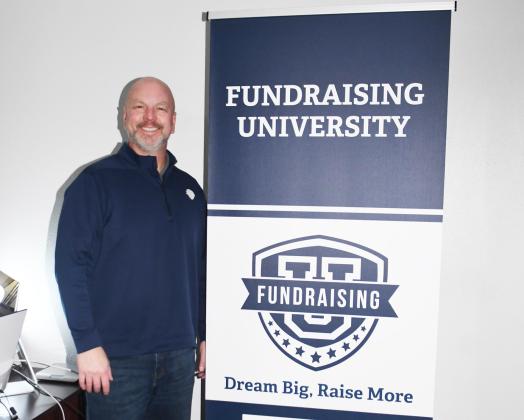Former coach now director of sales for growing organization
A former high school football coach is helping support young athletes and community organizations in a different way now, providing a platform to raise money through Fundraising University.
Steve Shannon of Aurora first worked with Fundraising University while an assistant football coach at Wahoo High School. He was so impressed with the program that he left his teaching/coaching career to join the Overland Park, Kan.-based organization as a territory manager in Aurora.
“I was lucky enough to work with this organization while I was the coach doing the fundraising at Wahoo,” Shannon recalled. “We turned our program around with coaches Chad Fox and Jason Iverson and they still do that same discount card fundraiser in the fall. That money allowed us to bring on other coaches, take our kids to camp and just give our kids opportunities that they wouldn’t have had if we didn’t have the resources, so it’s kind of a passion for me and it’s nice to be able to help others out.”
Shannon moved with his family to Aurora in 2015, covering a large territory from Seward to Ogallala, expanding south to the state border, which meant spending a lot of time on the road. In fact he put 247,000 miles on his vehicle during a five-year span as one of nine corporate representatives.
“So the way it works is we have an established system to make the most amount of money in the least amount of time with the least amount of interference,” he explained, citing cookie dough, popcorn, tumblers and game tickets as the most popular product lines. “If a group says they are looking to raise $10,000, I would sit down in some lead meetings and find out what’s the timeframe, when do we need the money, who’s going to be participating in the campaign and then just come up with a game plan to hit those goals.”
A typical fundraiser lasts seven to 10 days, Shannon noted, allowing coaches, players and supporters to raise funds quickly, keeping the focus on their sport or activity.
“That’s what my focus was and is,” Shannon explained. “I just want to have coaches coach and players play, but I also want them to have all the resources they need. If I can help provide them the structure to do that, that’s really what I need to do. I want to fit within their system, how they do things, and just give kids the ability to go out and have the opportunities to be successful. If being able to raise a little bit of money for the program means they can say yes to something versus having to say no, then that’s a good day.”
Though the name of the organization implies a link to education, Shannon said the clientele reaches far beyond school groups.
“The main group that we work with involves high school sports activities, but we do work with colleges, including NCAA and Division II schools, as well as middle schools and elementary schools,” he said. “But in reality we work with anybody in the community that needs assistance.”
For example, Shannon said he helped organize an event for Aurora Child Care to help pay for new playground equipment, showing that the fundraising model works for a broad range of organizations. The key, he said, is helping identify the goal, providing a structure and making the process easy for everyone involved.
“My role was to go in and simply say what are you doing currently because we’ve found that people are very generous and they want to be supportive, but they also don’t want to be nickel and dimed all the time,” he said. “So I would say what are you doing right now, let’s see what you’re doing that really works, keep that and see if I can help enhance it, but then let’s get rid of everything else.”
Using Aurora High School as an example of his clients while covering his initial territory, Shannon described the Fundraising University strategy.
“I wouldn’t want to do more than four or maybe five fundraisers in a year, but those four or five fundraisers would raise more money than 20 other fundraisers combined,” he said. “We’re not talking about big capital projects, but helping the softball team when they did their popcorn fundraiser or doing digital ticket sales in the spring with the activities when they needed some extra assistance. The reality is anytime you can go into a school and people just knew that they could simply lean back and let me help them out versus having five or six people doing things, hopefully that eases their mind knowing that if there was an issue they were going to be taken care of.”
His support role for each fundraiser is often behind the scenes, making sure the necessary sales materials are available, then following up with administrative and accounting help and making sure the products were delivered as ordered.
The program has been proven to work, Shannon said, citing a football team in Indiana that raised $106,000 in 10 days. He noted 75 groups that raised $20,000 or more since July alone, though the size of the campaign isn’t the only way to measure success.
“I had one fundraiser with a group of 15 kids and I apologized to the coach for raising only $3,000,” he recalled. “I thought we could maybe get to a higher amount, but the coach said, ‘Steve, the most we’ve ever raised previously was $400, so please understand that.’ So I guess you have to understand their expectations.”
There are situations where the program doesn’t fit, Shannon noted, and the company tries to help any interested party understand those limitations.
“So if someone says they have one student who is making a trip to Washington or something like that, sometimes those things just aren’t the best fit,” he said. “We still can try to accommodate some of those kinds of things as they come up, but really any time there is a team dynamic we can help as I’ve worked with churches for group trips, the Aurora Day Care to get some playground equipment and those kinds of things.”
Growing company
Fundraising University, a company founded in 2009 by Mike Bahun, had nine corporate representatives when Shannon signed on in 2015. The company, and his role with it have changed dramatically in recent years, first moving its corporate headquarters to Kansas City and then evolving toward a franchise model, which now lists 80 franchises nationwide with combined sales of more than $300 million.
In 2020, Shannon stepped away from his role as a territory manager and became director of operations as the company began to shift toward a franchise model. As the number of franchises grew, he was asked to fill a role as director of franchise support, and beginning in January of this year he was promoted to vice president of sales.
“Really, my role is the same,” he said from his home-based office in Aurora. “Having been on both sides of the table as the coach doing the fundraiser and as the representative helping teams, my role is just to help provide insight to any franchise owners or corporate reps that I can. We’ve got 80 locations now and we’re in the process of on-boarding another three or four franchise owners here in the next couple of months, so the pace is always different.”
Another change in the Fundraising University structure is the recent addition of a sister company called Coaching Matters (www.coachingmatters.org). Shannon explained that when the COVID-19 pandemic shut sports down for a time across the country, the company was looking for ways to continue supporting coaches.
“What we do with the schools is provide them the opportunity to work with our coaches on mental performance and mental performance training,” he said, mentioning Brian Cain as one of the top mental performance coaches in the nation as a team member. “We have calls once a month on a Monday where we bring in some of the top coaches and they talk about different things within the coaching realm; process over outcome or different things like that,” he explained. “Coaching Matters is just another piece that allows us to try to help coaches, which in turn helps kids. It’s just an added value that we try to bring to the coaching community.”
Shannon and his wife, Amanda, who works for the State of Nebraska from an office in Geneva, have three children: Gabby, Micah and Calvin, ages 26, 11 and 4.
For more information, go to www.fundraisingu.net.





